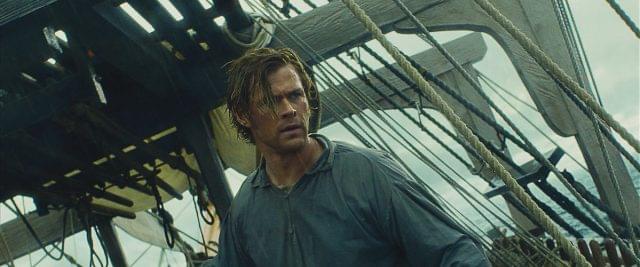
How do you turn the story of a giant murderous whale into something disappointing and forgettable? You hire Ron Howard, that’s how.
The pedestrian director brings his generically competent touch to “In the Heart of the Sea,” a maritime adventure based on the true story of the whaling ship Essex that ran afoul of an angry sperm whale in 1820. Where a more passionate filmmaker might have imbued this story with heroics and suspense, Howard is content to let it run on autopilot. Here’s the boat; here’s the whale; here’s what happened; thanks for coming, drive home safely.
In real life, the disaster of the Essex was among the incidents that informed Herman Melville’s “Moby-Dick.” In the movie, it’s Melville’s primary source, with an 1850 framing story showing him (played by Ben Whishaw) interviewing a survivor (Brendan Gleeson) about the event. At the end of the film, title cards tell us how great “Moby-Dick” turned out, as if Melville doing research was somehow the whole point of the story.
The actual story concerns Owen Chase (Chris Hemsworth), a Nantucket farmer-turned-whaler who is appointed first mate under captain George Pollard (Benjamin Walker). Chase has more experience than Pollard does, but Pollard is more the son of aristocrats than Chase is, so there you go. Capt. Pollard is cocky and arrogant, whereas Chase is a humble, hardy workingman with a pregnant wife waiting for him at home.
Chase and Pollard butt heads at sea, though it never turns into the “obsessed captain hunts whale” scenario that all the “Moby-Dick” buildup had led us to expect. (That aspect of Melville’s novel apparently came from somewhere else.) What conflict there is in the story is more of the man-vs-nature variety, as enormous sea creatures wreak havoc on the Essex and her smaller whaleboats, just because the seamen are trying to kill the whales and collect their oil.
Fierce storms and irritated whales eventually force the surviving crew members to take desperate measures — yet even then the film fails to find any drama or horror in their situation. And not to spoil anything, but their situation IS RIFE WITH DRAMA AND HORROR! Again, to take this material and turn it into something that barely arouses any emotion is almost an achievement in itself. The screenplay, adapted by Charles Leavitt (“K-PAX,” “The Express”) from Nathaniel Philbrick’s nonfiction bestseller, sets up many relationships — Chase and his wife (Charlotte Riley), Pollard and his crew-member cousin (Frank Dillane), even the old salt in 1850 and his wife (Michelle Fairley), who wants him to open up about his traumatic past — but doesn’t explore any of them meaningfully.
For what it’s worth, the movie looks terrific, and the whales (which must have been mostly computer-generated) are convincingly large and weighty. To be sure, there are exciting moments here and there in the narrative; if there were none, the movie would be bad, which it isn’t. It’s only mediocre and pointless. Ron Howard: a name you can trust.
C+ (2 hrs., 1 min.; )





